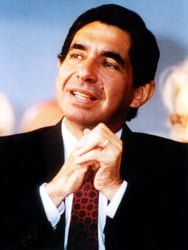Ralph Nader, an influential consumer advocate, and Oscar Arias, former President of Costa Rica, debated the effects of globalization to a packed Dana Auditorium. The lecture was sponsored by and part of the Joseph M. Bryan Distinguished Visiting Professorship Series.
Junior Lucas Wolf introduced Arias as “one of the developing world’s most influential voices,” and described his authorship of the Arias Peace Plan in 1987. Arias received the Nobel Prize for the plan that same year.
Sophomore Debbie Harris introduced Nader, whose accomplishments stretch from his publication of Unsafe at Any Speed in 1965 to his 2000 Presidential candidacy and the subsequent publishing of Crashing the Party: How to Tell the Truth and Still Run for President.
“What makes Ralph Nader so remarkable is his commitment to actual people,” Harris said.
Moderator Larry Schooler, a reporter for WFDD, opened the debate with “a rather elementary question: what is globalization?”
Nader stated that the real issue is corporate globalization, as opposed to civil or environmental globalization, and cited several recent trade agreements that support the “primacy of commercial trade over environmental, consumer, and health safety agreements.”
“Poverty will be alleviated by addressing four basic needs – food, shelter, health care, and the right to speak out,” Nader said. “These are the real standards of living,” none of which require international trade.
Arias defined globalization more simply, as “the economic and social development of the world’s poor countries.” The fastest way to correct the ills of poverty, he said, is to allow widespread and free access to global markets. “This means authentic free trade, something which has not yet been seen.”
“Until poor countries can export their goods, they will have no choice but to keep exporting their people,” Arias said.
The discussion that followed touched on NAFTA, the World Trade Organization, the textile industry, the Israeli/Palestinian conflict, weapons funding, education, and military action against Iraq.
Nader and Arias disagreed on the specifics of many of these issues. For example, Arias stated that NAFTA should be expanded to include Central American countries. Nader disagreed, claiming that “NAFTA has been a failure” and that expanding it would only accelerate existing trends.
Despite their disagreement, however, the speakers came together on other issues. Both criticized the current White House administration. “We don’t have courageous leaders in our country,” said Nader in response to a question about U.S. involvement in the Middle East. “I’m sorry to say that today in the White House we have someone who behaves far more like a West Texas sheriff than a president of the United States.”
“Unfortunately, this country is too arrogant to believe in diplomacy,” Arias added. “If they sell you cheap oil, you support them.”
Overall, Nader and Arias shared, as Arias said, “a vision for a world with less poverty and more social justice.” Although the methods they each advocate are different, the ultimate goals are the same.
“There is nothing glamorous or nave or idealistic about peace,” said Arias. “Peace is not a dream. It is hard work.

